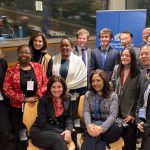Working Groups for the preparations for and follow up of the
Second World Summit for Social Development
We call entry-level professionals or students of social sciences or a related field who have a strong interest in family policies and want to gain experience in the work of international organizations to form working groups on the preparations and follow up of the Second World Summit for Social Development.
Each group will be formed by June 2024 and will consist of a minimum of 5 and a maximum of 10 members, with an appointed leader. They will focus on studying these commitments and their implications for the family, as detailed in the Civil Society Declaration for the 30th anniversary of the International Year of the Family in 2024 (see below).
The meetings for each group will start in June 2024 and will take place once a month, to work on research and recommendation regarding each one of those topics, with the mentioned background documents for each one of them.
If you want to be part of a group, please register here:
Background Information
The United Nations General Assembly has decided to convene the Second World Summit for Social Development in 2025, to address gaps and recommit to the principles outlined in the 1995 Copenhagen Declaration on Social Development and Programme of Action and give momentum towards the implementation of the 2030 Agenda for Sustainable Development.
The social summit will take place almost 30 years after the historic first World Summit For Social Development, where heads of state and government set out an ambitious common vision of social development aimed at social justice, solidarity, harmony and equality within and among countries. The above mentioned Programme of Action places people at the center of development, with commitments including poverty eradication, promoting full employment and social inclusion.
This is another historic milestone in the social action of the United Nations and will give momentum towards the implementation of the 2030 Agenda for Sustainable Development.
When it established the World Day of Social Justice, the General Assembly recognized that social development and social justice are indispensable for the achievement and maintenance of peace and security within and among nations and that, in turn, social development and social justice cannot be attained in the absence of respect for all human rights and fundamental freedoms. As a matter of fact, many people around the world are not able to see their human rights respected and are not able to be free because they are not respected as a family.
The pivotal role of the family in social development is an issue of social justice, and the nexus between attention to families and the promotion of human rights and freedoms is incontrovertible. As we reflect upon the global landscape, it becomes evident that the right to form a family remains precarious for many, particularly marginalized groups such as women and youth.
Therefore, central to our advocacy at the International Federation for Family Development is the recognition of the interplay between the objectives of the Declaration of Copenhagen and the International Year of the Family. These dimensions underscore the multifaceted nature of attention to familial welfare, warranting concerted action.
- Early childhood development
- The science of early brain development can inform investments in early childhood (Harvard University)
- The formative early years of a child’s life demand a nurturing environment and attentive care (UNICEF)
- Investing in the early years is one of the smartest things a country can do (World Bank)
- Youth social integration
- Why is it important to understand youth integration? (Cohesive Society)
- Social integration in youth: Insights from a social network perspective (American Psychological Association)
- Youth employment policies (ILO)
- Climate change awareness and adaptation
- Adaptation as adjustments in ecological, social or economic systems (UNFCC)
- Family communication about climate change (US National Library of Medicine)
- Climate anxiety in children and young people and their beliefs about government responses (The Lancet)
- Flexibility in workplaces
- Navigating the complex landscape of flexibility (Forbes)
- Redesigning how we work (Harvard Business Review)
- Redesigning the workplace to be family-friendly (UNICEF)
- Urban planning response to family needs
- Urban planning and quality of life (Elsevier)
- Urbanization and Families (United Nations DESA)
- How UNICEF could engage with urban planning? (UNICEF)
- Value of unpaid care work
- The missing link in the analysis of gender gaps in labour outcomes (OECD)
- Redistribute unpaid work (UN Women)
- Care work and care jobs for the future of decent work (ILO)
- Overcoming the intergenerational digital gap
- How to combat generational digital exclusion (ICT Solutions & Education)
- The economic consequences and generational impact of the digital divide (Harvard Kennedy School)
- The intergenerational digital gap with regard to silver workers (Institute for Forecasting of Slovak Academy of Sciences)
- Parental education and support
- Maximizing the most critical enabling environment (UNESCO)
- Parenting knowledge, attitudes, and practices (US National Library of Medicine)
- Positive parenting: concept and applications (United Nations)
- Healthy active ageing
- What do we know about healthy aging? (US National Institutes of Health)
- The Active Ageing Index (United Nations Economic Commission for Europe and European Union)
- Healthy ageing and functional ability (World Health Organization)
- Family reunification for migrants
- Family reunification (UNHCR)
- Family reunification (IOM)
- Family reunification / reunion (Council of Europe)






